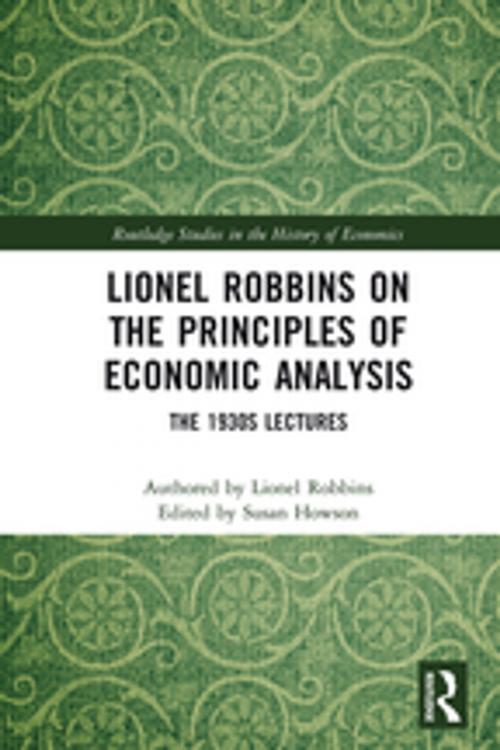Lionel Robbins on the Principles of Economic Analysis
The 1930s Lectures
Business & Finance, Economics, Theory of Economics| Author: | Lionel Robbins | ISBN: | 9781317225812 |
| Publisher: | Taylor and Francis | Publication: | January 31, 2018 |
| Imprint: | Routledge | Language: | English |
| Author: | Lionel Robbins |
| ISBN: | 9781317225812 |
| Publisher: | Taylor and Francis |
| Publication: | January 31, 2018 |
| Imprint: | Routledge |
| Language: | English |
Lionel Robbins (1898–1984) is best known to economists for his Essay on the Nature and Significance of Economic Science (1932 and 1935). To the wider public he is well known for the 'Robbins Report' of the 1960s on Higher Education, which recommended a major expansion of university education in Britain. However, throughout his academic career – at Oxford and the London School of Economics in the 1920s, and as Professor of Economics at the School from 1929 to 1961 – he was renowned as an exceptionally gifted teacher. Generations of students remember his lectures for their clarity and comprehensiveness and for his infectious enthusiasm for his subject.
Besides his famous graduate seminar his most important and influential courses at LSE were the Principles of Economic Analysis, which he gave in the 1930s and again in the late 1940s and 1950s, as well as the History of Economic Thought, from 1953 until long after his official retirement. This book publishes for the first time the manuscript notes Robbins used for his lectures on the Principles of Economic Analysis from 1929/30 to 1934/40. At the outset of his career he took the advice of a senior colleague to prepare his lectures by writing them out fully before he presented them; the full notes for most of his pre-war lectures survive and are eminently decipherable.
Since he made two major revisions of the lectures in the 1930s the Principles notes show both the development of his own thought and the way he incorporated the major theoretical innovations made by younger economists at LSE, such as John Hicks and Nicholas Kaldor, or elsewhere, notably Joan Robinson. He intended to turn his lecture notes into a book, abandoning the project only when he was asked to chair the Committee on Higher Education in 1960. This volume is not exactly the book he wanted to write, but it is a unique record of what was taught to senior undergraduate and graduate economists in those 'years of high theory'. It will be of interest to all economists interested in the development of economics in the twentieth century.
Lionel Robbins (1898–1984) is best known to economists for his Essay on the Nature and Significance of Economic Science (1932 and 1935). To the wider public he is well known for the 'Robbins Report' of the 1960s on Higher Education, which recommended a major expansion of university education in Britain. However, throughout his academic career – at Oxford and the London School of Economics in the 1920s, and as Professor of Economics at the School from 1929 to 1961 – he was renowned as an exceptionally gifted teacher. Generations of students remember his lectures for their clarity and comprehensiveness and for his infectious enthusiasm for his subject.
Besides his famous graduate seminar his most important and influential courses at LSE were the Principles of Economic Analysis, which he gave in the 1930s and again in the late 1940s and 1950s, as well as the History of Economic Thought, from 1953 until long after his official retirement. This book publishes for the first time the manuscript notes Robbins used for his lectures on the Principles of Economic Analysis from 1929/30 to 1934/40. At the outset of his career he took the advice of a senior colleague to prepare his lectures by writing them out fully before he presented them; the full notes for most of his pre-war lectures survive and are eminently decipherable.
Since he made two major revisions of the lectures in the 1930s the Principles notes show both the development of his own thought and the way he incorporated the major theoretical innovations made by younger economists at LSE, such as John Hicks and Nicholas Kaldor, or elsewhere, notably Joan Robinson. He intended to turn his lecture notes into a book, abandoning the project only when he was asked to chair the Committee on Higher Education in 1960. This volume is not exactly the book he wanted to write, but it is a unique record of what was taught to senior undergraduate and graduate economists in those 'years of high theory'. It will be of interest to all economists interested in the development of economics in the twentieth century.















